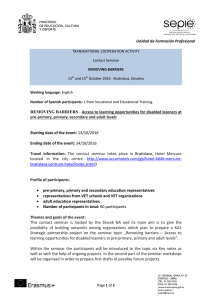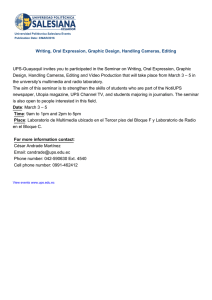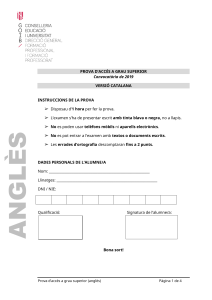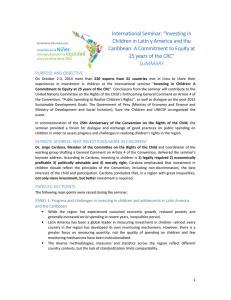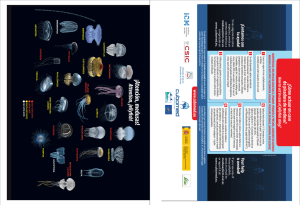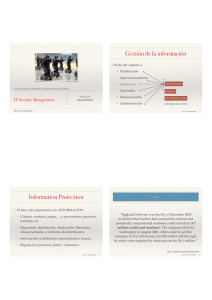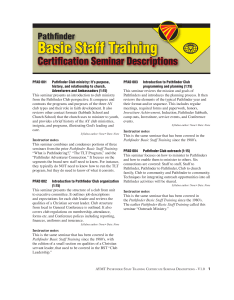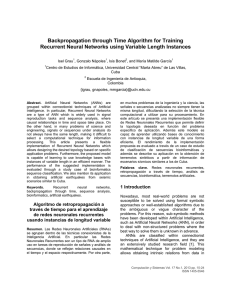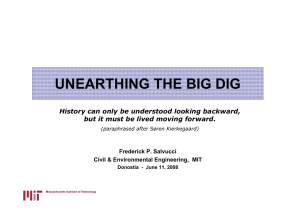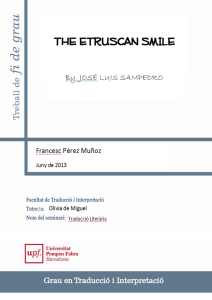Consumer behavior PDA 2015
Anuncio
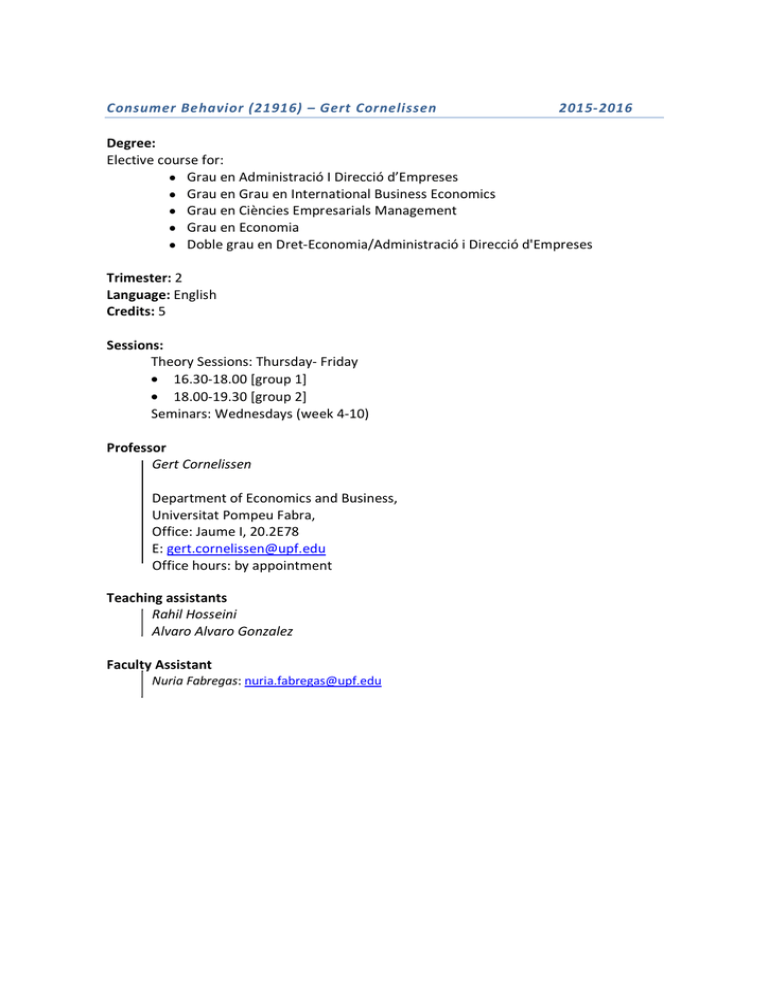
Consumer Behavior (21916) – Gert Cornelissen 2015-2016 Degree: Elective course for: • Grau en Administració I Direcció d’Empreses • Grau en Grau en International Business Economics • Grau en Ciències Empresarials Management • Grau en Economia • Doble grau en Dret-Economia/Administració i Direcció d'Empreses Trimester: 2 Language: English Credits: 5 Sessions: Theory Sessions: Thursday- Friday • 16.30-18.00 [group 1] • 18.00-19.30 [group 2] Seminars: Wednesdays (week 4-10) Professor Gert Cornelissen Department of Economics and Business, Universitat Pompeu Fabra, Office: Jaume I, 20.2E78 E: [email protected] Office hours: by appointment Teaching assistants Rahil Hosseini Alvaro Alvaro Gonzalez Faculty Assistant Nuria Fabregas: [email protected] Contact and questions I am looking forward to getting to know you better during the term and appreciate any comments you might have on the course. I value personal interaction with students, and therefore will not respond to questions about the course via email. 1. I welcome you to ask (many) questions during the lectures. 2. If you want to discuss an issue that is not of general interest, I am happy to talk to you before or after lectures. 3. If you do have an urgent questions and comments of general interest, but you prefer not to bring them up in public, please use the online discussion board, so that everyone can be informed. 1. Course description In the future, historians might refer to our times as one in which people lived in a “consumer culture”. Being a consumer is one of the most prominent roles we have in life (everything we do seems to be consuming of some sort), and the world around us organizes itself around that role. The new traditions that develop in our culture, for example, now mostly involve buying things, or they take it to the next level, and celebrate consuming itself (see “Black Friday”). In this course we will try to develop insight into how we make choices as consumers, by studying aspects of human psychology on the one hand, and the world in which we operate on the other hand. We will train your intuition about human nature so you can think more accurately about how consumers perceive and respond to market events. Many of the insights that we discuss are particularly useful for strategy, brand positioning, and marketing communication decisions. However, they are very relevant as well for those taking a policy-oriented perspective, in studying the reasoning errors that consumers make, or the value priorities that a consumer culture promotes, and how those relate to human well-being. • • • • • • • • • 2. Competences General Understanding and correctly interpreting academic writings. (G1. Comprender e interpretar de manera pertinente y razonada textos escritos de nivel y carácter académicos.) Being able to justify and defend your position using coherent arguments. (G2. Ser capaz de justificar con argumentos consistentes las propias posturas, así como de defenderlas públicamente) Being able to use the technological tools typically used applied in academic activities (G5. Dominar las herramientas informáticas y sus principales aplicaciones para la actividad académica ordinaria) Being able to work in groups, participate actively and discuss diverging opinions (G6. Ser capaz de trabajar en equipo, participando activamente en las tareas y negociando ante opiniones discrepantes hasta llegar a posiciones de consenso) Developing ability for reasoning and critical thinking in order to analyze controversial issues. (G7. Desarrollar la capacidad de razonamiento autónomo con distancia crítica en temas o cuestiones controvertidas.) Accepting the diversity of opinions as a fundamental ingredient of academic life and as an essential component of contemporary society. Being able to form your own opinion while respecting the diverging opinions from others. (G8. Aceptar la diversidad de puntos de vista como un ingrediente fundamental de la vida académica y consustancial a la sociedad contemporánea, y ser capaz de dar a conocer las propias opiniones dentro del respeto a las opiniones divergentes.) Reinforcing your habits of self-discipline, self-control and rigor in completing academic work and in managing your time schedule. (G9. Tener consolidados hábitos de autodisciplina, autoexigencia y rigor en la realización del trabajo académico, así como en la organización y en su correcta temporalización.) Having a proactive attitude toward learning about the topics you do not know and toward the learning process and/or professional activity more generally. (G10. Tener una actitud proactiva en el deseo de conocer aquello ignorado, imprescindibles en todo proceso formativo y en toda actividad profesional con proyección.) Being able to make creative use of the knowledge and concepts learnt in the course. Being able to adapt those to novel and original situations. (G11. Ser capaz de aplicar con flexibilidad y creatividad los conocimientos adquiridos y de adaptarlos a contextos y situaciones nuevas.) Specific • Use the correct information when formulating ideas and solving problems (G17. Utilizar la información adecuada en la formulación de propuestas y la resolución de problemas) • Employ different types of reasoning to analyze decision making (G18. Aplicar el razonamiento económico a la toma de decisiones) • Apply the material learned to diverse settings (G20. Aplicar los conocimientos y procedimientos relevantes a un abanico de situaciones complejas) • Identify key issues when analyzing a problem (G21. Identificar los factores claves de un problema) • Approach new situations with an open and critical mind (G22. Demostrar una aproximación crítica ante situaciones diversas) 3. Content This is a tentative description – details are subject to change during the quarter in the service of improving students’ learning. Part 1: Being a consumer Topic 1 – General introduction to consumer behavior Topic 2 – Evolutionary Bases of Consumption Topic 3 – Consumer Culture Part 2: Zooming in on the consumers’ psychological machinery Topic 4 – Consumer Memory Topic 5 – Judgment and choice Topic 6 – Affect and motivation Topic 7 – The self in a social setting Topic 8 – Social influence 4. Evaluation 4.1. Evaluation components The grades will be based on the following components: A. For the theory section 1. Final exam The final exam will be a Multiple Choice Exam featuring questions encompassing the totality of the content covered in the theory sessions. B. For the seminars 2. Group project 3. Project Presentation 4. Class participation The seminars will use a debate format. In the beginning of each seminar, two groups of students will each present one position in the debate. These presentations should provide a starting point of a lively debate on issues that are currently relevant to academics, practitioners, or members of our society in general. It is important that every student participates actively and engages in the discussions. That not only means coming to the seminar sessions but also sharing your thoughts, experiences, and insights with your fellow students. In case we notice that a student or a handful of students participate excellently during these discussions, we will award bonus points towards your participation grade. In order to facilitate the discussion and to be able to track your participation, we kindly ask that you use a name tag in all seminar sessions. The overall grade for the course is the weighted average of the grade obtained for the 4 components. The weights will be specified in the first session of the course. If the overall grade is 5 or above, the student passes the course. 4.2 Recovering a failing grade Under some conditions, students who failed the course will be authorized to take an additional evaluation (the make-up exam). The additional evaluation will be a multiple choice exam taken during the third trimester of the academic year. Only students that have participated in the course and the evaluations activities will be authorized to take the additional evaluation, as stated in the following article of the Agreement of the Government Council (Article 11.4.2): “Podran concórrer al procés de recuperació tots els estudiants que, havent participat a les activitats d'aprenentatge i avaluació durant el trimestre, hagin obtingut la qualificació de suspens de l'assignatura corresponent en l'avaluació trimestral. No hi podran concórrer els que no hagin participat en les activitats d'aprenentatge i avaluació o hagin renunciat a l'avaluació.” In English: To be eligible to take the recovery evaluation, students … • Must have participated in the learning activities and continuous assessment during the term: You are required to attend all seminar sessions, and complete all activities organized in the context of the seminars. There will be no attendance taken for theory sessions. • Must have taken the regular exam and have handed it in. Since, as it is stated in the above mentioned article, only those students who have failed the whole subject may participate in the process of recuperation, there will be no opportunity to participate for improving the grade if initially it is equal to or higher than 5.0. The grade obtained at the additional examination will be the final grade for the course. For students who will participate in exchange programs recognized by the Faculty in the 2nd trimester and therefore cannot attend the additional examination, a special arrangement will be made between the instructor and the student. Students in this situation should let the instructor know within 7 days of their grade being posted. Failure to do so implies that no extra arrangement will be made. 5. Bibliography and teaching resources 5.1. Basic bibliography The following book is considered mandatory background reading: Kardes, F.R., Cline, T.W., Cronley, M.L. (2011), Consumer Behavior: Science and Practice. South-Western: Cengage Learning Lectures are loosely based on this book, but will treat additional material. Supplementary readings will be made available during the term and posted on aula global. 6. Methodology This course consists of a combination of theory and seminar sessions. Theory is taught in two lectures of 90 minutes per week. During 6 weeks, we will organize debates during seminar sessions of 90 minutes a week. 7. Schedule Note: This schedule is tentative and may be subject to change to adapt to the needs and interests of the students in the class. Please consult Aula Global for the most up-to-date version. Week 1 • Introduction, course overview • The psychology of consumer behaviour part 1 Week 2 The psychology of consumer behaviour part 2 Week 3 Evolutionary bases of consumption Week 4 Consumer Culture Week 5 Consumer Memory Week 6 Consumer Judgment and Choice part 1 Week 7 Consumer Judgment and Choice part 2 Week 8 Consumers and their social context Week 9 Affect and Motivation Week 10 Social influence 8. A note regarding changing seminar groups If you are allocated to a seminar group that has sessions at a time where you have other commitments, you are authorized to propose a change of group. In case this is not satisfactorily organized by the faculty, we will use the following system to change groups. • You can change groups under the condition that you find somebody with whom you can exchange seminar spots. • This request should be done by filling out an online questionnaire before the beginning of the 5th Theory session: I will provide a link once the term has started. • You can only trade seminars with somebody from the same theory group: • In order to find a ‘trading’ partner, you can post messages to the online forum for the course on Aula Global.
